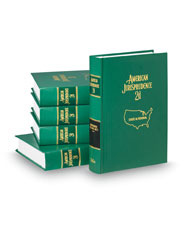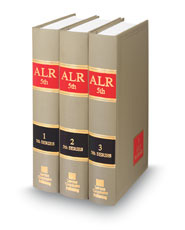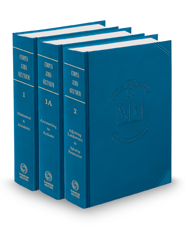Why Secondary Sources?
Secondary sources provide an analysis of an area of law. In addition to helping clarify confusing issues, secondary sources can point you to some of the most relevant primary sources, such as cases and statutes, to your topic.
Legal Encyclopedias
There are two national legal encyclopedias: American Jurisprudence 2d [AmJur] and Corpus Juris Secundum [CJS]. These will provide a basic summary of a legal topic. These are a good place to start your research if you do not kow much about your topic, and you are not concerned with jurisdiction at this point in your research.
The best way to find something in both of these is to use the index. AmJur and CJS are both on Westlaw, and AmJur is on Lexis too. However, given the size and scope of these sets, starting your research by using an index, and then looking at the sections online, will likely be more efficient than keyword searching the database.
Entries in both of these encyclopedias include footnotes to judicial opinions. You can use these opinions to find other, similar cases, using the techniques covered in the "Cases" tab.
American Law Reports

American Law Reports are a collection of attorney-written annotations about discrete legal topics. They are not organized by topic, like a state code or an encyclopedia, so you will have to use the index to find relevant annotations, or do word searches in them. There have been several series of American Law Reports published - it is on its 6th series. There are also Federal and International themed ALR series. Be alert and note the series you are using.
Treatises and Hornbooks
Treatises and hornbooks offer in-depth explanations about an area of law. Treatises can span for several volumes, and authoritaively cover a legal topic in detail. This detail includes references to many primary sources. Hornbooks are similar to treatises, but are generally condensed to one volume. Both can be used to gain a greater understanding of the law, but should be cited in court documents very infrequently, if ever.
-
-
Friedman on Contracts and Conveyances of Real Property by
Call Number: KF670 .F75 2005ISBN: 1402406827Also available on BloombergLaw -
Restatements
-
Restatement of the Law, Second. Property Second - Landlord and Tenant byCall Number: KF395.A2 P754
The Restatements of the Law represent an attempt by the legal scholars, under the auspices of the American Law Institute, to distill the common law into clear, organized rules. While these do not have the force of a statute, many courts have looked to the Restatements in shaping there decisions, so a section may in fact be controlling in your jurisdiction. The Restatement also include commentary explaining the rules they put forth.
Their are Restatements on several areas of law. Restatements dealing with Property Law include:
-
Restatement of the Law, Third. Property - Servitudes by
Call Number: KF395.A2 P78 2000 -
Restatement of the Law, Third. Property - Mortgages byCall Number: KF395.A2 M67 1997
Journal Articles
Keep in mind that many journal articles explore the boundaries of property law. They can critically examine property rights, and propose new directions for the courts to take the law. While this may be what you are looking for, note the the article may not thoroughly explain the current state of the law. For that, try looking at a treatise or hornbook first.
Some people refer to law reviews as law journals. While some "journals" are less scholarly than a "review," in general, you cannot tell if an article is scholarly just by the name of the journal or review it appears in. Instead, the publisher of an article is a better indication of its scholarly bent.
There are two primary ways to search for journal articles. First, you can use the Index to Legal Periodicals to search for articles by topic. There is a database covering articles written after 1981. It includes many of the articles in full text. For older articles, there is the Index to Legal Periodicals Retrospective.
Secondly, you can search for full text articles in several databases. WestlawNext lets you search Law Reviews and Journals under the "Secondary Sources" item in the Browse box. In Lexis Advance, you will need to filter your search results to find articles along with other secondary sources. Finally, do not forget HeinOnline, which has an extensive full text collection of journals, with more older journals than either Lexis or Westlaw.


